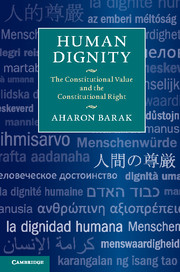Book contents
- Frontmatter
- Contents
- Preface
- Acknowledgements
- Table of Cases
- Part I Fundamental concepts and sources
- Part II Human dignity as a constitutional value
- Part III Human dignity as a constitutional right
- 8 Recognition of the constitutional right to human dignity and its content
- 9 Human dignity as a framework right (mother-right)
- 10 The area covered by the right to human dignity
- Part IV Human dignity in comparative law
- Bibliography
- Index
- References
10 - The area covered by the right to human dignity
Published online by Cambridge University Press: 05 February 2015
- Frontmatter
- Contents
- Preface
- Acknowledgements
- Table of Cases
- Part I Fundamental concepts and sources
- Part II Human dignity as a constitutional value
- Part III Human dignity as a constitutional right
- 8 Recognition of the constitutional right to human dignity and its content
- 9 Human dignity as a framework right (mother-right)
- 10 The area covered by the right to human dignity
- Part IV Human dignity in comparative law
- Bibliography
- Index
- References
Summary
The area covered and the overlap problem
As a result of the broad scope of the constitutional value of human dignity in most legal systems, excluding Germany, the constitutional right to human dignity also has a broad scope. This situation raises many questions. I shall discuss four methodological questions. The first is the question of whether or not there is an area of human existence that is exclusively (or uniquely) covered by the constitutional right to human dignity. Second, what is the role of the constitutional right to human dignity in areas where there is complementary overlap between the right to human dignity and the other constitutional rights? Third, what is the relationship between the constitutional right to human dignity and the constitutional right to personal liberty? Fourth, should the right to human dignity be considered a “residual right”?
The area covered exclusively by the right to human dignity in a comprehensive bill of rights
The answer to the question whether human dignity has an exclusive zone of application – an exclusive normative territory – is to be found in the structure of the constitutional bill of rights. The more extensive the bill of rights, and rich in constitutional rights that have human dignity as a purpose, so the exclusive zone – the exclusive normative territory – of human dignity as a constitutional right narrows. Take for example the Bill of Rights in the Constitution of South Africa. This bill of rights includes most of the civil and social constitutional rights recognized in comparative law. As a result, most of the situations that fall within the right to human dignity also fall within one of the other constitutional rights. Thus, for example, one of the purposes underlying the right to freedom of expression in the Constitution of South Africa is dignity. This purpose also underlies the constitutional right to human dignity. The result is that this “zone” of human dignity is no longer exclusive to the constitutional right of human dignity; it overlaps with the constitutional right to freedom of expression. An additional example is the constitutional right to equality. Underlying this right is an important component of human dignity.
- Type
- Chapter
- Information
- Human DignityThe Constitutional Value and the Constitutional Right, pp. 170 - 182Publisher: Cambridge University PressPrint publication year: 2015



